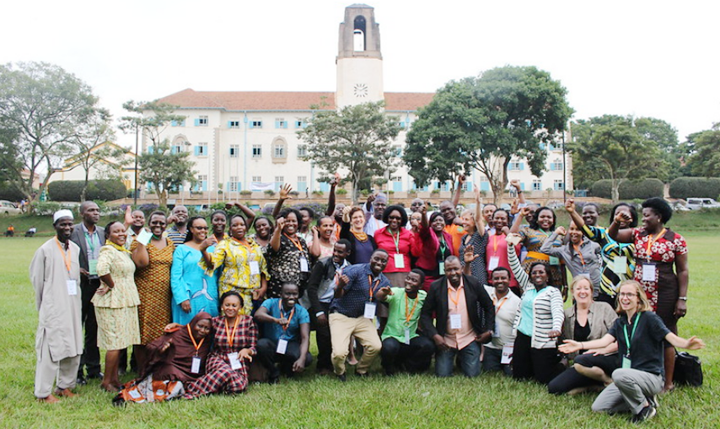
Participants and trainers of the GREAT gender-responsive cereal grains breeding course that was held at Makerere University, September 2017 Photo Credit: GREAT
Makerere University and the CGIAR, in August 2024, renewed their Memorandum of Understanding (MoU) to accelerate efforts to create more inclusive agricultural systems in Africa. With funding of US$ 99,935 through the CGIAR GENDER Impact Platform, Makerere University will implement the activities through the Gender-responsive Researchers Equipped for Agricultural Transformation (GREAT) Project, co-implemented by the College of Agricultural and Environmental Sciences and the School of Women and Gender Studies.
This renewed partnership focuses on developing and enhancing postgraduate training and research in gender and agrifood systems at Makerere University. This is in line with the broader aim of nurturing a cadre of gender-responsive agricultural researchers (both social and biophysical scientists), equipped to contribute to inclusive and effective agricultural systems that address the priorities of both women and men in Sub-Saharan Africa and beyond.
Dr. Florence Kyazze, the GREAT Principal Investigator, emphasized the significance of the MoU, stating that, “This renewed partnership is an opportunity to enhance the curriculum in gender and agriculture and align it with changing needs, the latest knowledge, and best practices in gender and agrifood systems”.
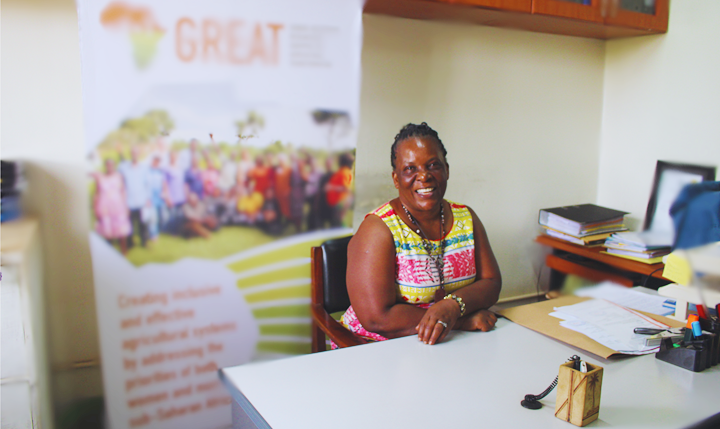
Above: Dr Florence Birungi Kyazze, GREAT Principal Investigator. Photo Credit: GREAT
In the new partnership, Makerere will initiate the development of a Masters program with an intermediary postgraduate diploma in gender and agricultural development. The interdisciplinary program taught by faculty members in the fields of agriculture, gender studies, rural development, and sociology, drawn from the College of Agricultural and Environmental Sciences, the School of Women and Gender Studies, other relevant units of Makerere University, and other universities, will emphasize the integration of theory and practice.
The proposed program will embrace a blended and more flexible learning environment to enable learners to maneuver the multiple roles that balance school, work in gender and agrifood systems, and other spheres of life. “It is important to equip students with the necessary tools and skills that can be used in real-life agricultural programming situations; from research to community interventions and policy levels using flexible approaches to drive gender equality in agriculture ”, remarked Dr Kyazze.
The MoU marks a critical step in reinforcing the commitment of both institutions to promote gender-responsive agricultural innovations, ultimately fostering a more equitable and sustainable future for all, contributing to Sustainable Development Goals 2, 4, and 5.
About GREAT:
GREAT started as a 5-year collaborative capacity-building program between Makerere University and Cornell University in the USA with core funding from the Bill and Melinda Gates Foundation (2015-2020). Co-led by Prof. Margaret Najjingo Mangheni (Makerere) and Prof. Hale Ann Tufan (Cornell), GREAT later transitioned into a broadened tripartite two-year partnership to include the OneCGIAR through the GENDER Impact Platform (2021-2023).
At Makerere University, GREAT is implemented by the College of Agricultural and Environmental Sciences (CAES) and the School of Women and Gender Studies (SWGS), with the secretariat at CAES.
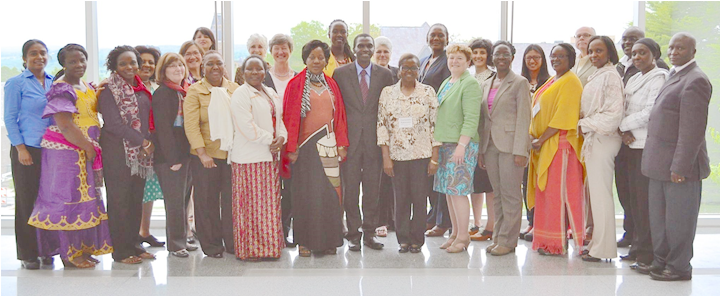
GREAT maiden Stakeholder meeting in 2014, Cornell University, New York, USA. Photo Credit: GREAT
Vision and strategy:
GREAT equips researchers to create more inclusive and effective agricultural systems by addressing the priorities of both women and men in sub-Saharan Africa (SSA). From inception, the strategy to achieve this vision was through i) supporting Makerere University to become a Centre of Excellence (CoE) for gender-responsive agricultural research and training in sub-Saharan Africa (evidenced by adequate staff capacity, visibility, and high reputation in the region), ii) capacity building of researchers to conduct gender-responsive agricultural research, ii) fostering information exchange, dialogue and collaboration on gender-responsive research; and, iv) triggering support of gender-responsive research in the National Agricultural Research Systems (NARS) and building a cadre of champions – all which have been achieved to a larger extent.
Towards this vision, GREAT has:
- Strengthened ample technical capacity of 14 staff at Makerere University to conduct gender-responsive agricultural research and training;
- Established a track record for delivering high-quality courses evidenced by growing demand for fee-paying short courses beyond the BMGF grant.
- Established connections with renowned international scholars and experts in gender and agriculture who contribute to course offerings as short-term consultants based on need.
- Established strategic partnerships with various institutions such as the One CGIAR, US Universities- Cornell, Michigan State, University of Georgia, and National Agricultural Research Institutions of Uganda, Burundi, and Burkina Faso
- Delivered five (5) mainstream gender-responsive plant breeding (Level 1) courses, One (1) Level 2 course, One (1) gender-responsive plant breeding and seed systems in South Asia course, and 10 custom courses (tailored to suit clients’ needs)
- Trained a pool of 362 fellows drawn from Africa, South Asia, Latin America on gender-responsive agricultural research
- Published three special journal issues with over ten articles, and two trainers’ manuals on gender-responsive plant breeding
- Contributed to the enhancement of the curriculum on gender and agriculture-related course units at Makerere University taught by GREAT trainers
- Created various knowledge products and communication channels to amplify the visibility of the work on gender-responsive agriculture research.
- Raised 3.58 million US Dollars in grants to Makerere University
For more information, please contact:
Dr Florence Birungi Kyazze, GREAT P.I Email: fbirungikyazze@gmail.com
Dr Losira Nasirumbi Sanya, GREAT Associate P.I: losira.nasirumbi@mak.ac.ug
Ms Elizabeth Asiimwe, GREAT Program Manager: alizeff@yahoo.com
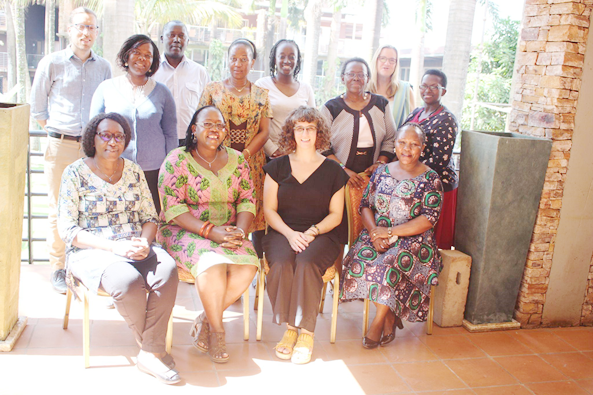
GREAT Year 5 Annual Meeting in 2019. Photo Credit: GREAT
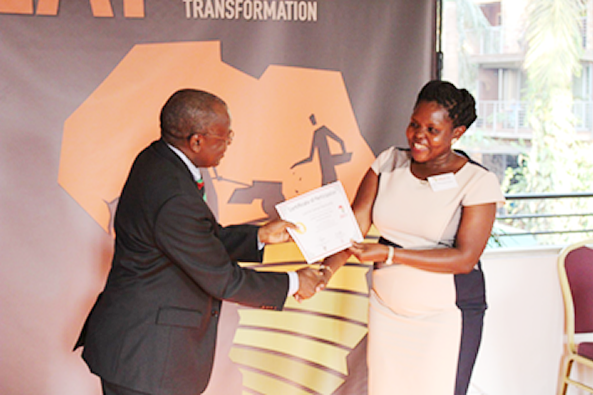
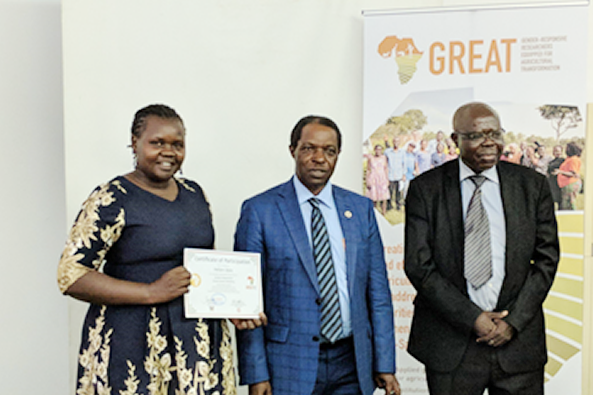
Above: Participants awarded certificates of completion after GREAT Courses. Photo Credit: GREAT
R: Ms Hellen Opie from NARO, and a PhD Student of Agricultural and Rural Innovations at CAES receives her certificate from the former Deputy Vice-Chancellor, Prof. William Bazeyo (M), and the former Ag Executive Director of ASARECA (R) (2018)
Written by Elizabeth Asiimwe, GREAT Project Manager
